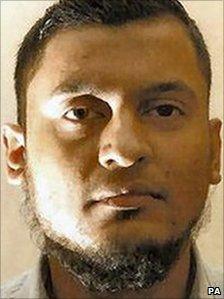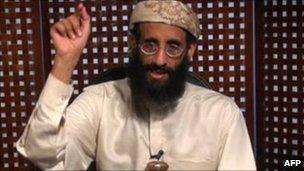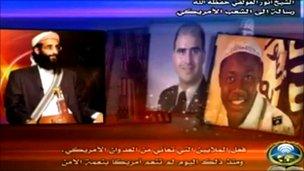Rajib Karim: The terrorist inside British Airways
- Published

Rajib Karim was arrested in Newcastle in February 2010
A former British Airways worker has been convicted of four counts of preparing acts of terrorism. Rajib Karim's trial revealed new details about how Islamist extremists in the West forge links with groups overseas.
The British Airways worker was acting under orders from Anwar Al-Awlaki, described in court as a "major terrorist planner," who exerts a powerful influence on his followers, despite being on the run in Yemen.
Trial testimony also suggests Karim had developed links with sympathisers in the UK, including another man who worked at BA.
But Karim's journey to jihad began on the other side of the world, when both he and his brother Tehzeeb turned towards al-Qaeda's world view.
The brothers, who are from a wealthy family in Bangladesh, began following radical Islamist thinking over the internet and in study circles.
Along with friends who were educated at the same private school, they supported Jammat-ul Mujahideen Bangladesh (JMB) which fought to establish an Islamic state in the country.
The group, banned in both Bangladesh and the UK, launched a violent bombing campaign in 2005 - but its leaders were arrested and later executed.

Anwar al-Awlaki's perfect grasp of English has made him attractive to Western jihadists
With the group in disarray, the brothers wanted to seek new outlets to satisfy their dream of dying as martyrs.
But Rajib Karim's ambitions were put on hold. He had travelled to the UK with his British wife to seek medical attention for their sick young son.
Meanwhile, Tehzeeb had successfully travelled to Yemen where the group al-Qaeda on the Arabian Peninsula had established a base.
He succeeded in getting an audience with Anwar Al-Awlaki, whom, in messages, the brothers referred to reverentially as "professor."
Growing support
Al-Awlaki, an American citizen of Yemeni origin, was attracting growing support from young jihadists in the West because he had one attractive feature over other radical preachers: he spoke perfect Western English.
The preacher and AQAP has been linked with a series of incidents over the past two years, including the killing of 13 people at Fort Hood in Texas and the failed attempt to bomb a plane heading to Detroit on Christmas Day 2009.
Two incidents have directly affected the UK. The woman who stabbed MP Stephen Timms in "revenge" for the Iraq War was inspired by his sermons. And, last autumn, a cargo plane bound for the US was intercepted in the UK with explosives hidden in a printer cartridge.
Mustafa Abulhimal from the Quilliam Foundation, a counter extremism think-tank, said al-Awlaki's danger came from what he has inspired others to do.
"In his relatively short career in the violent world of extremism today, he has managed to unfortunately inspire a significant number of individuals in the States and Europe.

Awlaki uses slick media productions to sell his message
"These individuals are either in direct e-mail exchange with Awlaki or are inspired by his audio tapes which, until very recently, were in the public domain and even some universities…"
"What this audience needs is some material, not necessarily a military camp or training camp in a mountainous area, they just want to be sitting at their computer and receive by the internet all the violent material."
His hardline rhetoric - delivered in online English-language sermons - spoke directly to the Karim brothers, neither of whom could understand Arabic.
Al-Awlaki sent the brothers a personal audio message confirming that he had survived a US missile attack. Rajib told Tehzeen that, "hearing the shaykh's voice filled my heart with joy."
But Rajib was torn about how best to assist the global jihad. He hated living among non-Muslims in Newcastle. Longing to fight jihad, he told his brother to "please mention me by name, that Allah grants me martyrdom at the earliest."
He was even prepared to take his pregnant wife with him to fight. "If the new baby dies or she dies while delivered... they will be counted as martyrs," he told his brother.
As the months wore on, he became increasingly maudlin. He frequently complained to his brother about his isolation and his desperation to fight and die in the holy war. "My desire is to gain martyrdom before you or with you," he said.
But Al-Awlaki had other ideas for the BA software engineer. In January 2010, he passed an "urgent message" to Karim telling him he was "excited" that they had a man on the inside of one of the world's biggest airlines.
"I pray that Allah may grant us a breakthrough through you," he said.
He told Karim to stay where he was, rather than travel to Yemen for terrorist training. Rajib, he said, might be able to provide us with critical and urgent information."
Four days later Karim replied, explaining that he had "worked very hard in painting myself as a liberal Muslim." That was a view supported by testimony at the trial from his closest BA colleagues, none of whom realised his true intentions.
Access all areas?
Karim told the preacher that he had access to BA's servers and could erase all the data, causing massive disruption and financial loss. In evidence, BA witnesses said that the airline would lose £20m a day if its IT systems collapsed - although they stressed that Karim did not have access at that time to live systems.
Karim told Al-Awlaki that managers at BA were looking for volunteers to work as cabin crew, covering for any colleagues who went on strike during the airline's 2009 industrial dispute.
He applied but was rejected because he had not been in the company long enough. Undeterred, he told Al-Awlaki: "I personally know two brothers, one who works in baggage handling at Heathrow and another who works in airport security... but I am not sure if they are at the stage to sacrifice with their lives."
The baggage handler was later arrested - but was released without charge and is currently reported to be appealing against losing his job.
In his last message to Karim, Al-Awlaki identified his objectives: "Our highest priority is the US. Anything there, even on a smaller scale compared to what we may do in the UK, would be our choice.
"With the people you have is it possible to get a package or a person with a package on board a flight heading to the US?"
Karim replied, in a message that sealed his fate: "I can work with the bros to find out the possibilities of shipping a package to a US-bound plane."
Ten days later British counter-terrorism police officers arrested Karim at his desk at work.
During his evidence, Karim appeared articulate and intelligent, arguing that he wanted to use Al-Awlaki to get access to the jihad in Yemen, rather than to launch attacks on the West. But the evidence told its own tale.
It took detectives nine months to fully decrypt Karim's secret messages to Awlaki and his brother - the most complex code-breaking work ever undertaken by counter-terrorism officers.
Their success in deciphering his coded heart-to-heart chats with his brother provided the police with the evidence used to devastating effect in this trial. He now faces a life sentence.
- Published17 February 2011
- Published15 February 2011
- Published2 February 2011
- Published1 February 2011